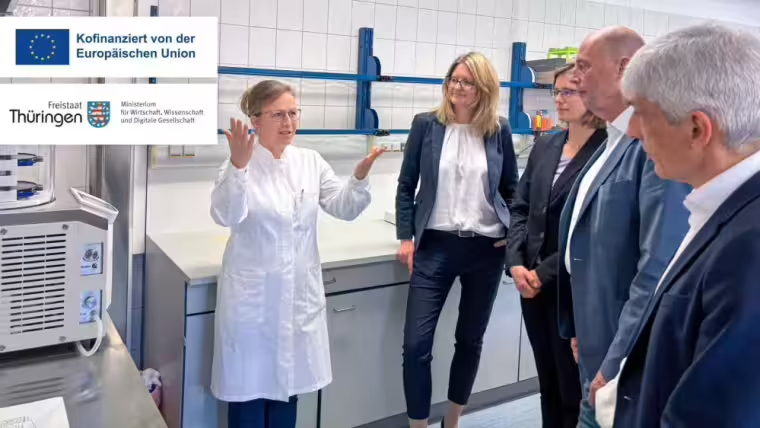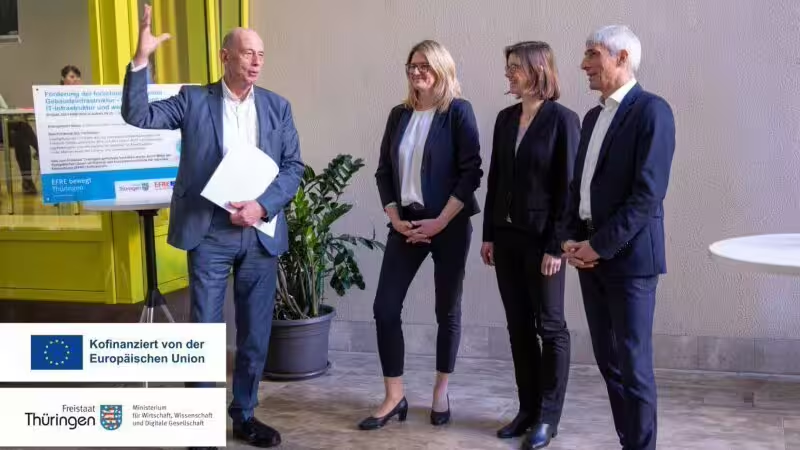
- Light
Published: | By: Lavinia Meier-Ewert; English translation by Gleb Chupakhin
Source article
On December 5th, Thuringia's Minister of Science Wolfgang Tiefensee visited ACP's partner, the Leibniz Institute of Photonic Technologies (Leibniz-IPHT) to learn about new technologies advancing biophotonic and microscopic methods. Thuringia supported the acquisition of cutting-edge equipment with €10.5 million from the European Regional Development Fund (ERDF, in German EFRE) last year. The new research infrastructure will be used by the scientist working in the Abbe Center of Photonics' field of biophotonics in collaboration with Leibniz-IPHT. The aim is to develop new research areas in medicine, pharmacy, and life and environmental sciences.
"With these investments, we are strengthening research and development at the interface of medical and photonic technologies, which in recent years have become a true area of expertise for Thuringia," said Science Minister Wolfgang Tiefensee. According to the Minister, the funding will not only benefit the regional scientific landscape, but will also lay the foundation for innovative new products and processes, increasing the competitiveness of the Thuringian biotechnology and medical technology sectors.
New Equipment Promotes Interdisciplinary Cutting-Edge Research
Among the newly acquired equipment are a combined fluorescence and atomic force microscope (AFM), a 3D nanoprinter, and various spectroscopic and microscopic instruments. This infrastructure supports collaboration between Friedrich Schiller University Jena and Leibniz-IPHT and promotes interdisciplinary research approaches.
The ERDF funding provides important, innovative political impulses for health research and digitalization, as outlined in the 'Roadmap for Better Patient Care.' At the same time, it strengthens the university's key research areas LIGHT and LIFE, enhancing Jena's national and international visibility as an outstanding scientific hub.
Dr. Thoralf Held, Chancellor of Friedrich Schiller University Jena
"This modern infrastructure also enables us to continue the successful collaboration between the university and non-university research institutions in Thuringia – particularly through the joint appointments of male and female professors, which we have been successfully implementing for years," added the Chancellor.
Technology for the Medicine of the Future
One example of the newly acquired equipment is a microscope that combines fluorescence microscopy with atomic force microscopy. It provides detailed insights into biological processes – from analyzing individual cells to precisely manipulating nanoparticles. Using these technologies, researchers can better understand the fundamentals of infectious diseases and develop new approaches for personalized treatment strategies.
"State-of-the-art technologies like these open up new perspectives for biophotonic research and its application in medicine and life sciences," said Prof. Dr. Jürgen Popp, Co-Director of the Abbe Center of Photoncis and Scientific Director of Leibniz-IPHT. "They allow us to precisely capture the dynamics of biological processes and advance innovations in diagnostics and therapy. We thank the dedicated collaboration between the University of Jena, Leibniz-IPHT, and the Thuringian Ministry of Science for the successful implementation of this joint project."
Scientific Discoveries and Regional Development
The ERDF funding is part of Thuringia's innovation strategy and helps to strengthen regional research infrastructure and enhance national and international visibility. It also supports the training of talented young researchers and the expansion of research on socially relevant issues.
Contact:
07743 Jena Google Maps site planExternal link
